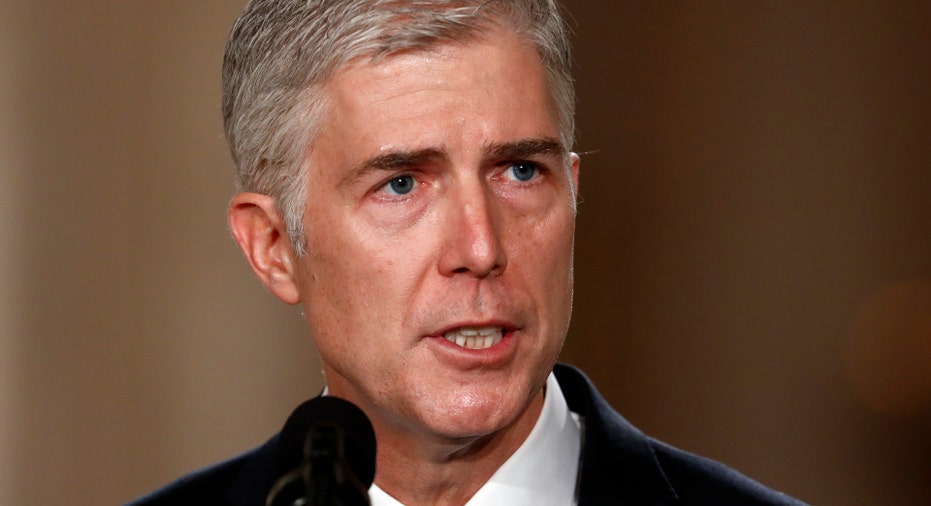Gorsuch Supreme Court Nuclear Showdown: Financial Cases Hang in Balance

Lawmakers clashed on Capitol Hill in an historic way Thursday over President Donald Trump’s Supreme Court nominee Judge Neil Gorsuch, as Republicans changed Senate rules to advance his nomination.
Republicans, unable to assemble the 60 votes necessary to end the Democrats' filibuster, responded by invoking the controversial nuclear option, which will allow Gorsuch to be confirmed with a simple majority of votes. Under these circumstances, Gorsuch will likely be confirmed by Friday.
The ideologically divided sitting justices have one big marquee case left in this term and two cases in the upcoming term that stand to impact religion, state budgets and the finance industry—and the Court’s deciding vote (or lack thereof) could make all the difference.
Trinity Lutheran Church of Columbia v. Comer
Trinity Lutheran is the last big controversial case of the 2017 term. At the center of the debate is a church located in Missouri that operates a preschool and daycare center with a playground open to students when school is in session, and open to the public when school is out. The state of Missouri offers a grant program to nonprofits and government entities that Trinity Lutheran applied to for help with the cost of resurfacing the blacktop on the playground. The application was denied because of the school’s religious affiliation.
The question that will be argued before the Supreme Court is whether an institution can be denied access to a secular benefit program on the basis of its religious affiliation.
“The Court will grapple with whether the government’s asserted justification for denying the grant at issue – not wanting to directly fund houses of worship – is strong enough to allow for treating religious institutions differently than non-religious ones when both are otherwise equally qualified for a particular benefit,” Ilya Shapiro, senior fellow in constitutional studies and editor-in-chief of the Cato Supreme Court Review at the Cato Institute, told FOX Business.
Arguments for Trinity Lutheran are set to begin April 19. If Gorsuch is confirmed by Friday he will be able to hear the arguments and participate in this case. If not, he will likely be ineligible to rule on it.
As Justice Sonia Sotomayor pointed out at a conference in September, with eight justices the Court has ruled “very, very, very narrowly” on a few cases. In Trinity Lutheran, Gorsuch could cast the deciding vote.
“Based on how solicitous Judge Gorsuch has been of religious liberty, I would expect him to side with the church,” Shapiro said.
Leidos, Inc. v. Indiana Public Retirement System
Last week, the Supreme Court agreed to review two cases in the upcoming term: Leidos, Inc. v. Indiana Public Retirement System and U.S. Bank National Association v. Village of Lakeridge.
Leidos is a securities fraud corruption case involving a government contractor (Leidos) that is being sued by investors claiming the company left pertinent information out of a 2011 securities filing at the expense of shareholders.
Two of the company's employees were convicted over an alleged kickback scheme that was found to have defrauded New York City into paying more than $700 million on a project that was originally budgeted for $63 million.
The Indiana Public Retirement system alleges Leidos violated a portion of SEC requirements (Item 303) by failing to disclose the scandal as part of “trends and uncertainties” that “are reasonably likely to result in” a substantial change in liquidity for shareholders. The investigation was not reported to investors until it had already become a tangible problem, and many investors lost a sizeable amount of money.
Leidos argues it did not violate Section 10(b)(5) of the Securities and Exchange Act, which states it is illegal to intentionally make false statements or omit information that would otherwise deceive shareholders.
The issue at stake: “Can you be held liable for an omission when there was no prior faulty statement that had to be corrected?” John Coffee, head of Columbia Law School's Center for Corporate Governance, told FOX Business.
Coffee bets on a 4-4 split along ideological lines based on the current composition of the Court.
“With Gorsuch I would bet the appellant [Leidos] wins. 5-4 Republican vs Democratic majority,” he said.
Under these circumstances, Coffee believes the implication would be vast for investors and shareholders.
“[It would] greatly cut back on the kinds of omissions for which companies can be held liable,” he said.
U.S. Bank National Association v. Village of Lakeridge
U.S. Bank National Association v. Village of Lakeridge is a bankruptcy case in which one of the creditors had a close personal relationship with a member of the debtor and its corporate designee from whom he purchased a $2.76 million insider claim from for $5,000. At issue is the standard by which a voting member involved in confirming a Chapter 11 plan should be judged an “insider” where it pertains to the bankruptcy code. The justices will decide between two standards used among the appellate courts known as the “de novo” standard and the “clearly erroneous” standard.
According to the de novo standard, the appellate court should review the case anew, and give no deference to the findings of the lower courts. The clearly erroneous standard is essentially the opposite, meaning courts should give heavy weight to the findings of lower courts.
“The standard of review in this context is important...whether you get tagged with being an insider is a big deal. And the standard of review in large part dictates whether you can meaningfully appeal that determination,” John Pottow, an expert in bankruptcy and commercial law and professor at the University of Michigan Law School, told FOX Business.
This case is scheduled for the 2018 term which begins in the fall.



















